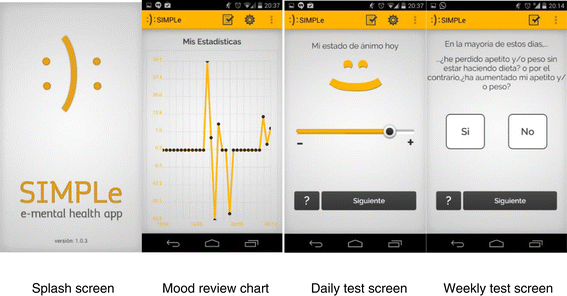Self-monitoring and psychoeducation in bipolar patients with a smart-phone application (SIMPLe) project: design, development and studies protocols
- PMID: 25884824
- PMCID: PMC4379950
- DOI: 10.1186/s12888-015-0437-6
Self-monitoring and psychoeducation in bipolar patients with a smart-phone application (SIMPLe) project: design, development and studies protocols
Abstract
Background: New technologies have recently been used for monitoring signs and symptoms of mental health illnesses and particularly have been tested to improve the outcomes in bipolar disorders. Web-based psychoeducational programs for bipolar disorders have also been implemented, yet to our knowledge, none of them have integrated both approaches in one single intervention. The aim of this project is to develop and validate a smartphone application to monitor symptoms and signs and empower the self-management of bipolar disorder, offering customized embedded psychoeducation contents, in order to identify early symptoms and prevent relapses and hospitalizations.
Methods/design: The project will be carried out in three complementary phases, which will include a feasibility study (first phase), a qualitative study (second phase) and a randomized controlled trial (third phase) comparing the smartphone application (SIMPLe) on top of treatment as usual with treatment as usual alone. During the first phase, feasibility and satisfaction will be assessed with the application usage log data and with an electronic survey. Focus groups will be conducted and technical improvements will be incorporated at the second phase. Finally, at the third phase, survival analysis with multivariate data analysis will be performed and relationships between socio-demographic, clinical variables and assessments scores with relapses in each group will be explored.
Discussion: This project could result in a highly available, user-friendly and not costly monitoring and psychoeducational intervention that could improve the outcome of people suffering from bipolar disorders in a practical and secure way.
Trial registration: Clinical Trials.gov: NCT02258711 (October 2014).
Figures



References
Publication types
MeSH terms
Associated data
LinkOut - more resources
Full Text Sources
Other Literature Sources
Medical

